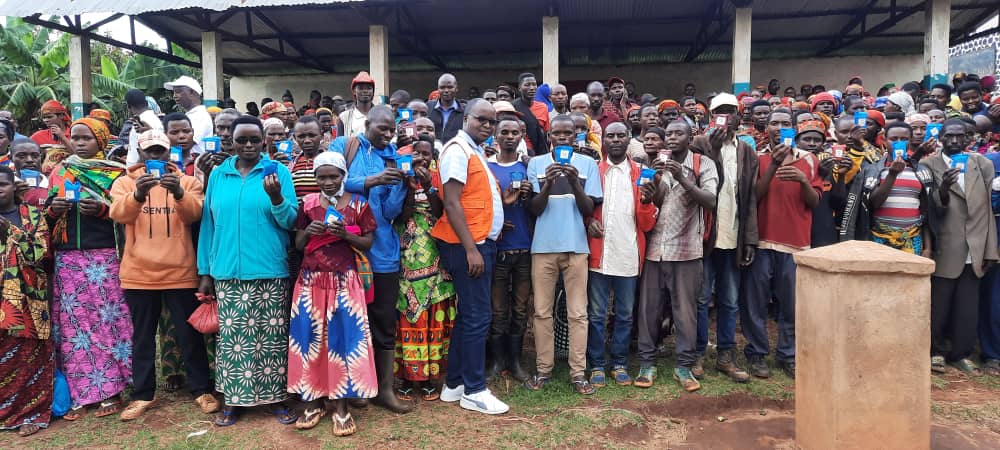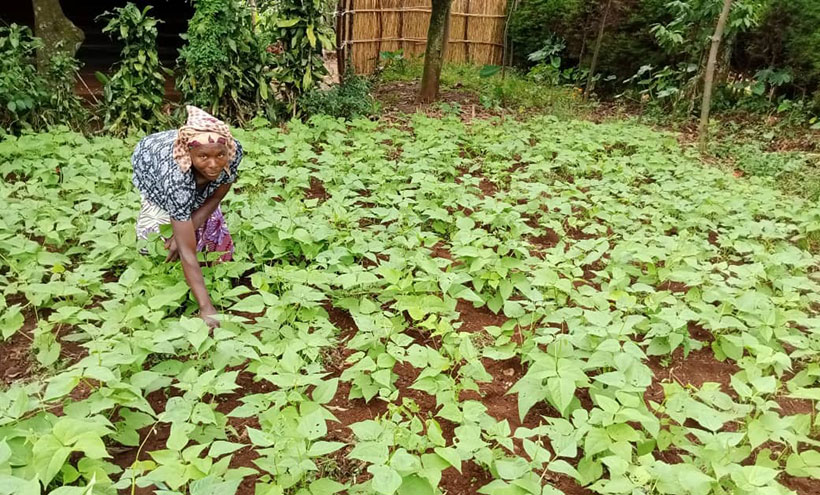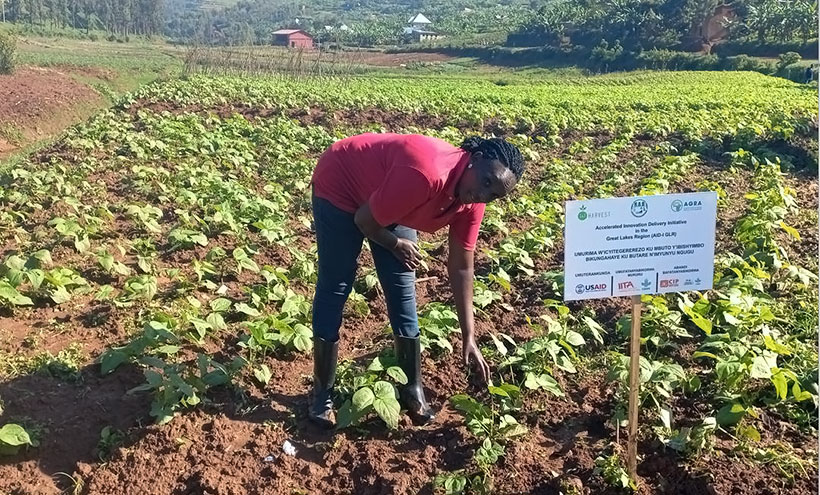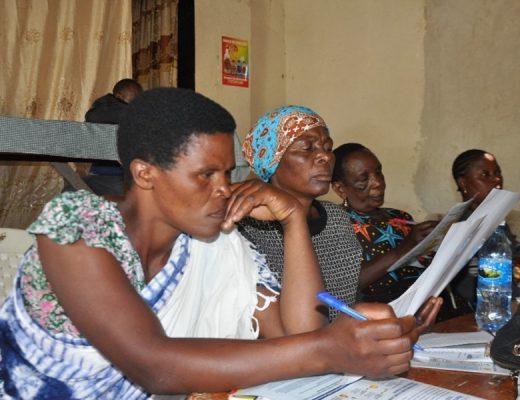The USAID-funded “Great Lakes Accelerated Innovation Delivery Initiative Rapid Delivery Hub” (AID-I GLR) harnesses the partnership with innovations development actors, the private sector, government agencies, and non-governmental organizations to deliver agricultural and nutritional practices and technologies to hundred thousand of farming households in Rwanda, Burundi, and the Democratic Republic of Congo (DRC).
Despite the abundance of agricultural and nutritional practices and technologies developed over the last 15 years by CGIAR centers and national partners, the Great Lakes Region is still battling high poverty and malnutrition. One of the reasons is that agricultural development initiatives have not systematically integrated these technologies and innovations in their respective scaling activities, thus reducing the potential for creating meaningful impact for women, men, and youth at the smallholder farmer level. AID-I GLR, a multiple-stakeholder project led by IITA–CGIAR and funded by USAID, is contributing to filling the gap.
AID-I GLR identifies options for scaling partnerships with the active private sector, government agencies, and non-governmental organizations while structuring those partnerships to deliver rapidly proven technologies adapted to local needs to an extensive network of farmers with advisory services. This Initiative is doing things differently, focusing only on technologies demanded by scaling partners leading the delivery efforts. It also offers the opportunity for scaling partners to use each network to reach many farmers with impactful complementary interventions.

Farmers in Burundi, Kayanza province, Rango Commune received improved seed packs of Musole Bean Variety for trial at the individual farm level.
The project has so far established partnerships with two dozen NGOs, private companies, innovation developers, and service providers in Burundi, the Democratic Republic of Congo (DRC), and Rwanda that are delivering quality seeds of improved varieties of food security and nutrition crops (beans, orange-fleshed sweet potato, maize, cassava, and potato), poultry, forage and veterinary products, fertilizers, and soil amendments. Other complementary interventions include advisory services and social and behavioral change campaigns on nutrition.
AID-I GLR uses the Village-Based Advisor (VBA) model adapted to each country. Scaling partners support seed companies/producers and other selected input suppliers to run mother demonstration plots and make small packs (100 – 500 g) of inputs (e.g., seeds, veterinary products, fertilizers, and soil amendments) for distribution to smallholder farmers, with advisory information to test on their farms as part of their promotional activities to expand their market.
AID-I GLR’s presence in the field is already felt four months after its inception. In Burundi, the two partnerships led by the World Vision (WVision) and Confédération des Associations des Producteurs Agricoles pour le Développement (CAPAD) worked closely with CGIAR centers, the Seed Systems Group (SSG), the Institut des Sciences Agronomiques du Burundi (ISABU), and the Ministry of Environment, Agriculture and Livestock, and farmer cooperatives; to promote the adoption and use of improved seeds of beans, and orange flesh sweet potato (OFSP) to reach more than 123,000 farmers during the first agricultural season of the year. Moreover, the project also harnesses the importance of livestock by introducing improved livestock practices for milk and poultry value chains and forage.

A farmer in her field trial for HM21 bean variety (received through small pack approach) in Karehe Zone (Lango Commune), Burundi
Apart from supporting input suppliers to prepare and expose farmers to technologies through small packs, the project also strengthens their capacity to increase their productivity and enhance their marketing to respond to more demand in the following seasons when farmers are satisfied with their products.
“The dissemination of new varieties of seeds through small packs approach accelerates the acquisition of knowledge by our farmers by observing and harvesting their individual demonstration plots. This strategy also helps our farmers know the source of supply of quality seed varieties through the information written on the small packs distributed,” urged Hatungimana Richard, President of Seed Multipliers in Burundi (CoopEDN).
Even though the VBA approach, with the use of 100 – 500 g of small packs of branded seed, is new to most partners, input producers have embraced it to create demand for their product and increase adoption. In Rwanda, one of the seed companies, I&J Harvest, has integrated the project’s approach into its operations, mainly to market their seeds for increased adoption.
“We have been facing the challenge of the lack of market for the seeds we multiply. We could not sell all the seeds in the store. Marketing is costly. AID-I GLR came up with the solution to brand the small packs of beans. This approach was new to me, yet promising. My contacts are now on the packaging material, allowing farmers to book seeds. They have started calling me to order seeds for the next season. Some farmers did not know where to find quality seeds for planting; they used to replant grains. Now they know where to find good quality seeds. This is a great achievement for my company,” Emma Uwera, Managing Director and Owner of the I&J Harvest Company, noted.

Emma Uwera in her beans demo plot in Rwamagana District, Eastern Province, Rwanda
The Scaling Partners in the DRC are using the VBA model to promote the application of good agronomic practices for rice, orange-fleshed sweet potato (OFSP), beans, and vegetable production, as well as improved rearing practices for milk production. During the cropping season of February 2023, more than 30,000 farmers received small seed packs of rice and bean to test in their plots. Besides, up to 21,000 livestock breeders were sensitized on the technique of making lick blocks, and 1,000 breeders attended the awareness campaign against bovine theileriosis.

Social Behavior Change messages delivered to Cattle Breeders about vaccination against Theleirosis, cow synchronization, and insemination in Luhihi village, Kabare Territory in South Kivu, DRC.
The project is expanding its partnership to improve the seed systems in the three countries so that seed producers and other agricultural inputs suppliers can expand the availability of their products close to production areas and increase sales.
In the medium term, AID-I GLR seeks to establish an Innovation and Technology Hub as a leading platform in the Great Lakes Region for private and public sector food system partners to access the latest science-based technologies and innovations developed by the CGIAR and partners.
About AID-I GLR
The Great Lakes Accelerated Innovation Delivery Initiative Rapid Delivery Hub (AID-I GLR) is a multiple-stakeholder initiative that improves food and nutrition security in the region through the rapid large-scale adoption of proven technologies and innovation by women and men farmers. Funded by the United States Agency for International Development (USAID) and led by the International Institute of Tropical Agriculture (IITA), AID-I GLR is slated to reach approximately 1,200,000 farming households in Burundi, the Democratic Republic of Congo (DRC), and Rwanda.
Contributed by: Ritha Bumwe



No Comments